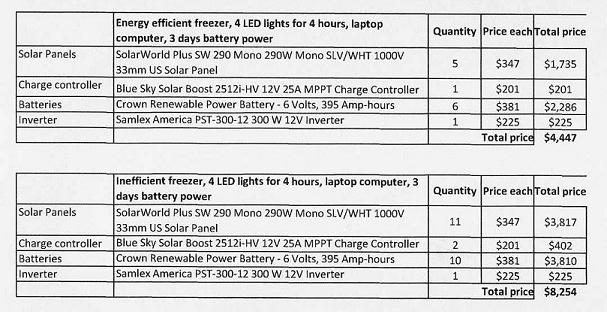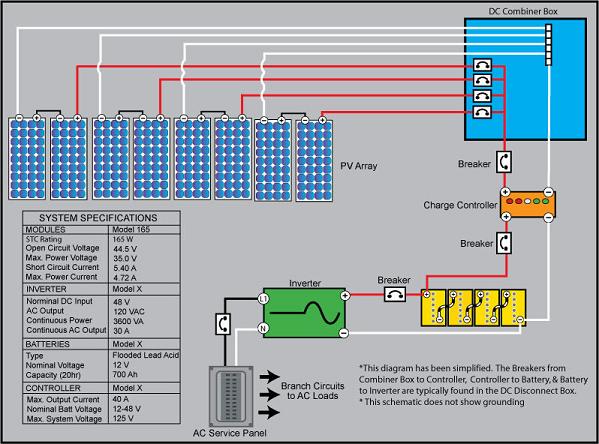Solar: Difference between revisions
No edit summary |
|||
| Line 82: | Line 82: | ||
|$1733 | |$1733 | ||
|} | |} | ||
===Installation Guidelines and Considerations=== | |||
===What to do when the Sun don't Shine=== | ===What to do when the Sun don't Shine=== | ||
=== | ===Home Sized Solar System=== | ||
===Solar System Sizing=== | ===Solar System Sizing=== | ||
| Line 99: | Line 101: | ||
This is a humorous example of the importance of managing electric use when you have a limited source. | This is a humorous example of the importance of managing electric use when you have a limited source. | ||
http://www.imdb.com/video/hulu/vi2444560153/?ref_=tt_ov_vi | http://www.imdb.com/video/hulu/vi2444560153/?ref_=tt_ov_vi | ||
A energy efficient chest freezer uses about .7 kilowatt hours per day. Four 9 watt LED lights used four hours will use about .3 kilowatt hours per day. My laptop computer uses about .7 kilowatt hours per day. The inefficient freezer uses about 2.4 kilowatt hours per day. | A energy efficient chest freezer uses about .7 kilowatt hours per day. Four 9 watt LED lights used four hours will use about .3 kilowatt hours per day. My laptop computer uses about .7 kilowatt hours per day. The inefficient freezer uses about 2.4 kilowatt hours per day. | ||
Revision as of 12:04, 24 December 2015
Solar has to do with the sun.
There are numerous ways to collect energy from the sun.
Solar Electric
No one does solar to beat the power company. Usually the reason someone puts in solar power is because they cannot get power in a particular place that needs some low voltage or they want some power that is renewable and reliable when there is nothing coming from the power company.
There is so much hype out there it is hard to tell what is the best deal. What would be nice is to find the best deals that makes the most sense for a particular need without having to become an electrical engineer or test two products we can't afford to find out we should have bought the third product we did not know about.
Terms and Definitions
Solar panel – creates electricity from sunlight
Charge Controller – uses electricity from solar panel to charge batteries. The charge controller protects the batteries by ensuring that the batteries are not overcharged
Inverter – Converts battery DC electricity to AC electricity that most appliances use
Electricity – the movement of electrons through a wire
- DC electricity – direct current electricity
- AC electricity – alternating current electricity
Volts – the force pushing the electrons
Amps – the amount of electrons moving through the wire
Watts – a unit that is a measure of electricity doing work in an instant of time. Watts is sometimes referred to as power.
- Watthour – one watt of electricity doing work for one hour
- Kilowatt hour – one thousand watts of electricity doing work for one hour. Your home electric bill says how many kilowatt hours you use each month.
A light bulb in your house may be rated at 100 watts. Burning that bulb for four hours uses 400 watthours or .4 kilowatt hours.
Basic Solar System
The two technical things we discovered is solar is a low voltage and high current application where large gauge wire is needed. The other do not undercharge your batteries. Battery manufactures will tell you at least 14.7-14.8V is required to charge a 12V battery.
There is a solar guy, Bob, who actually made a full time business out of fixing the messes created byother installers using poor practices and bad component choices.
In addition to fixing our wiring problem he identified our charge controller as the principle problem in our system He's actually done the kind of experimentation and research to figure out what the reliable, cost effective components one should use. That was 6 years ago and we're still using the same RV setup with the batteries we had to replace going strong.
One system that seemed to work plus solar wiring diagram:
| PCs | Description | Price |
|---|---|---|
| 1pc | MorningStar SI-300-115V -UL SureSine 300W Inverter, 115V, 60Hz | $251 |
| 1pc | Morningstar TS-45 TriStar 45 Amp Charge Controller 12-48V PWM | $150 |
| 4pc | Windynation 100 Watt Polycrystalline 12V Solar Panel | $524 |
| 4pc | Trojan T-105 6V 225Ah Flooded Lead Acid GC2 Deep Cycle Battery | $600 |
| 1pc | Bogart Engineering Trimetric TM-2030-RV Battery Monitor System | $155 |
| 1pc | Bogart Engineering Deltec 500 amp, 50 millivolt current shunt | $27 |
| 1pc | Square D Pull-Out Disconnect Switch 60A Not Fusible - UFP222R | $26 |
| Total | $1733 |
Installation Guidelines and Considerations
What to do when the Sun don't Shine
Home Sized Solar System
Solar System Sizing
P3 P4400 Kill A Watt Electricity Usage Monitor - The cheapest watt of electricity is the one you never use. Before building a solar system, make sure you have energy efficient appliances. It will be cheaper to upgrade an appliance then to build a solar system to handle inefficient appliances. The best way to determine how much electricity an appliance is using is with a Kill a Watt Electricity Usage Monitor
Plug the Kill a Watt into the wall outlet, plug appliance into the Kill a Watt. Let it run for about a week, the length of time does not have to be exactly one week, just needs a long period of time. At the end of one week push the right red button. It toggles between kilowatt hours and time. The time is in hours. Divide the kilowatt hours by the time and multiply by 24 to get average kilowatt hours per day for that appliance. Do this for each appliance you may want to power with solar.
Manage the usage - This is a humorous example of the importance of managing electric use when you have a limited source. http://www.imdb.com/video/hulu/vi2444560153/?ref_=tt_ov_vi
A energy efficient chest freezer uses about .7 kilowatt hours per day. Four 9 watt LED lights used four hours will use about .3 kilowatt hours per day. My laptop computer uses about .7 kilowatt hours per day. The inefficient freezer uses about 2.4 kilowatt hours per day.
The following are the components used in these examples to build a small 12 volt solar system. The price estimates do not include a frame for the solar panels, wires, breakers, combiner box, battery box and connectors.
Solar panels - SolarWorld Plus SW 290 Mono 290W Mono SLV/WHT 1000V 33mm US Solar Panel $347 each
Charge controller - Blue Sky Solar Boost 2512i-HV 12V 25A MPPT Charge Controller $201 each
http://www.civicsolar.com/product/blue-sky-solar-boost-2512i-hv-12v-25a-mppt-charge-controller
Batteries - Crown Renewable Power Battery - 6 Volts, 395 Amp-hours $381 each
Inverter - Samlex America PST-300-12 300 W 12V Inverter $225 each
http://www.civicsolar.com/product/samlex-america-pst-300-12-300-w-12v-inverter
Batteries are the most expensive part of the system. Solar panels keep getting cheaper over time but unfortunately batteries do not. Batteries are needed for night time and for cloudy days. These estimates assume that there will be at most three cloudy days in a row. That is the minimum. Allowing for more cloudy days would require more batteries and more solar panels to charge the additional batteries.
The following spreadsheets are to give you a ballpark idea of the costs. They are not meant to be complete systems. Consult an experienced person before you take the plunge into solar.
The following diagram shows the wiring of a sample 48 volt solar electric system. It is not based on the components listed above but is intended to show how solar electric system components are connected.

